401021 Spring 2018: Reflecting on Professional Nurse & Midwife Role
VerifiedAdded on 2023/06/03
|8
|2747
|142
Essay
AI Summary
This essay explores the journey of becoming a professional nurse or midwife, focusing on the transition from a new graduate to a registered professional within the healthcare system. It critically analyzes the factors influencing this transition, such as stress, workplace dynamics, and the development of both clinical and non-clinical skills. The essay also reflects on the application of the Dreyfus model of skill acquisition in nursing practice, highlighting the different stages of proficiency from novice to expert. Personal reflection is included, discussing emotional experiences and challenges faced during the transition, emphasizing the importance of continuous learning, adherence to NMBA standards, and the pursuit of personal and professional goals. The essay concludes by underscoring the complexity of nursing and the necessity of ongoing education and skill development to provide quality patient care.
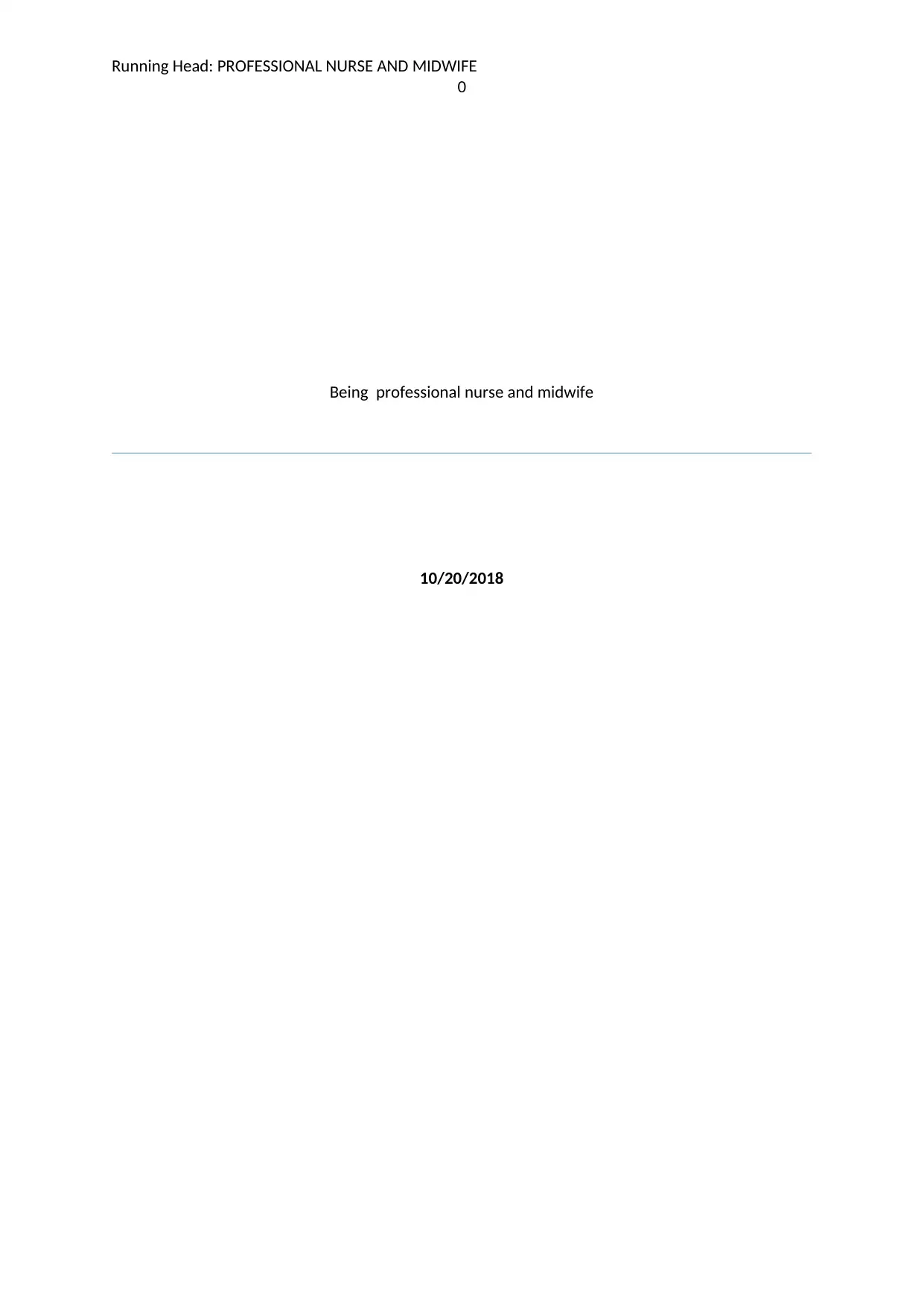
Running Head: PROFESSIONAL NURSE AND MIDWIFE
0
Being professional nurse and midwife
10/20/2018
0
Being professional nurse and midwife
10/20/2018
Paraphrase This Document
Need a fresh take? Get an instant paraphrase of this document with our AI Paraphraser
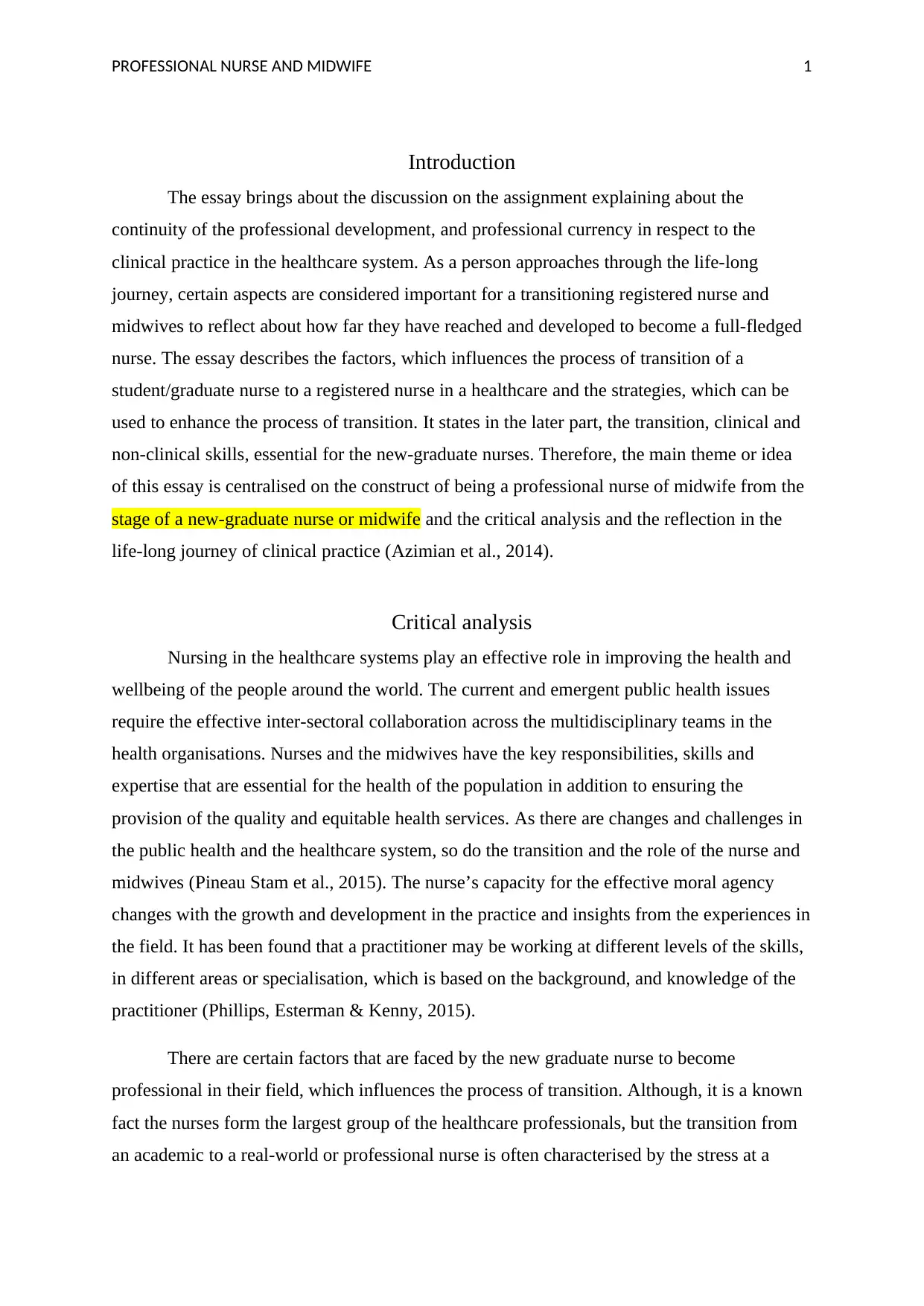
PROFESSIONAL NURSE AND MIDWIFE 1
Introduction
The essay brings about the discussion on the assignment explaining about the
continuity of the professional development, and professional currency in respect to the
clinical practice in the healthcare system. As a person approaches through the life-long
journey, certain aspects are considered important for a transitioning registered nurse and
midwives to reflect about how far they have reached and developed to become a full-fledged
nurse. The essay describes the factors, which influences the process of transition of a
student/graduate nurse to a registered nurse in a healthcare and the strategies, which can be
used to enhance the process of transition. It states in the later part, the transition, clinical and
non-clinical skills, essential for the new-graduate nurses. Therefore, the main theme or idea
of this essay is centralised on the construct of being a professional nurse of midwife from the
stage of a new-graduate nurse or midwife and the critical analysis and the reflection in the
life-long journey of clinical practice (Azimian et al., 2014).
Critical analysis
Nursing in the healthcare systems play an effective role in improving the health and
wellbeing of the people around the world. The current and emergent public health issues
require the effective inter-sectoral collaboration across the multidisciplinary teams in the
health organisations. Nurses and the midwives have the key responsibilities, skills and
expertise that are essential for the health of the population in addition to ensuring the
provision of the quality and equitable health services. As there are changes and challenges in
the public health and the healthcare system, so do the transition and the role of the nurse and
midwives (Pineau Stam et al., 2015). The nurse’s capacity for the effective moral agency
changes with the growth and development in the practice and insights from the experiences in
the field. It has been found that a practitioner may be working at different levels of the skills,
in different areas or specialisation, which is based on the background, and knowledge of the
practitioner (Phillips, Esterman & Kenny, 2015).
There are certain factors that are faced by the new graduate nurse to become
professional in their field, which influences the process of transition. Although, it is a known
fact the nurses form the largest group of the healthcare professionals, but the transition from
an academic to a real-world or professional nurse is often characterised by the stress at a
Introduction
The essay brings about the discussion on the assignment explaining about the
continuity of the professional development, and professional currency in respect to the
clinical practice in the healthcare system. As a person approaches through the life-long
journey, certain aspects are considered important for a transitioning registered nurse and
midwives to reflect about how far they have reached and developed to become a full-fledged
nurse. The essay describes the factors, which influences the process of transition of a
student/graduate nurse to a registered nurse in a healthcare and the strategies, which can be
used to enhance the process of transition. It states in the later part, the transition, clinical and
non-clinical skills, essential for the new-graduate nurses. Therefore, the main theme or idea
of this essay is centralised on the construct of being a professional nurse of midwife from the
stage of a new-graduate nurse or midwife and the critical analysis and the reflection in the
life-long journey of clinical practice (Azimian et al., 2014).
Critical analysis
Nursing in the healthcare systems play an effective role in improving the health and
wellbeing of the people around the world. The current and emergent public health issues
require the effective inter-sectoral collaboration across the multidisciplinary teams in the
health organisations. Nurses and the midwives have the key responsibilities, skills and
expertise that are essential for the health of the population in addition to ensuring the
provision of the quality and equitable health services. As there are changes and challenges in
the public health and the healthcare system, so do the transition and the role of the nurse and
midwives (Pineau Stam et al., 2015). The nurse’s capacity for the effective moral agency
changes with the growth and development in the practice and insights from the experiences in
the field. It has been found that a practitioner may be working at different levels of the skills,
in different areas or specialisation, which is based on the background, and knowledge of the
practitioner (Phillips, Esterman & Kenny, 2015).
There are certain factors that are faced by the new graduate nurse to become
professional in their field, which influences the process of transition. Although, it is a known
fact the nurses form the largest group of the healthcare professionals, but the transition from
an academic to a real-world or professional nurse is often characterised by the stress at a
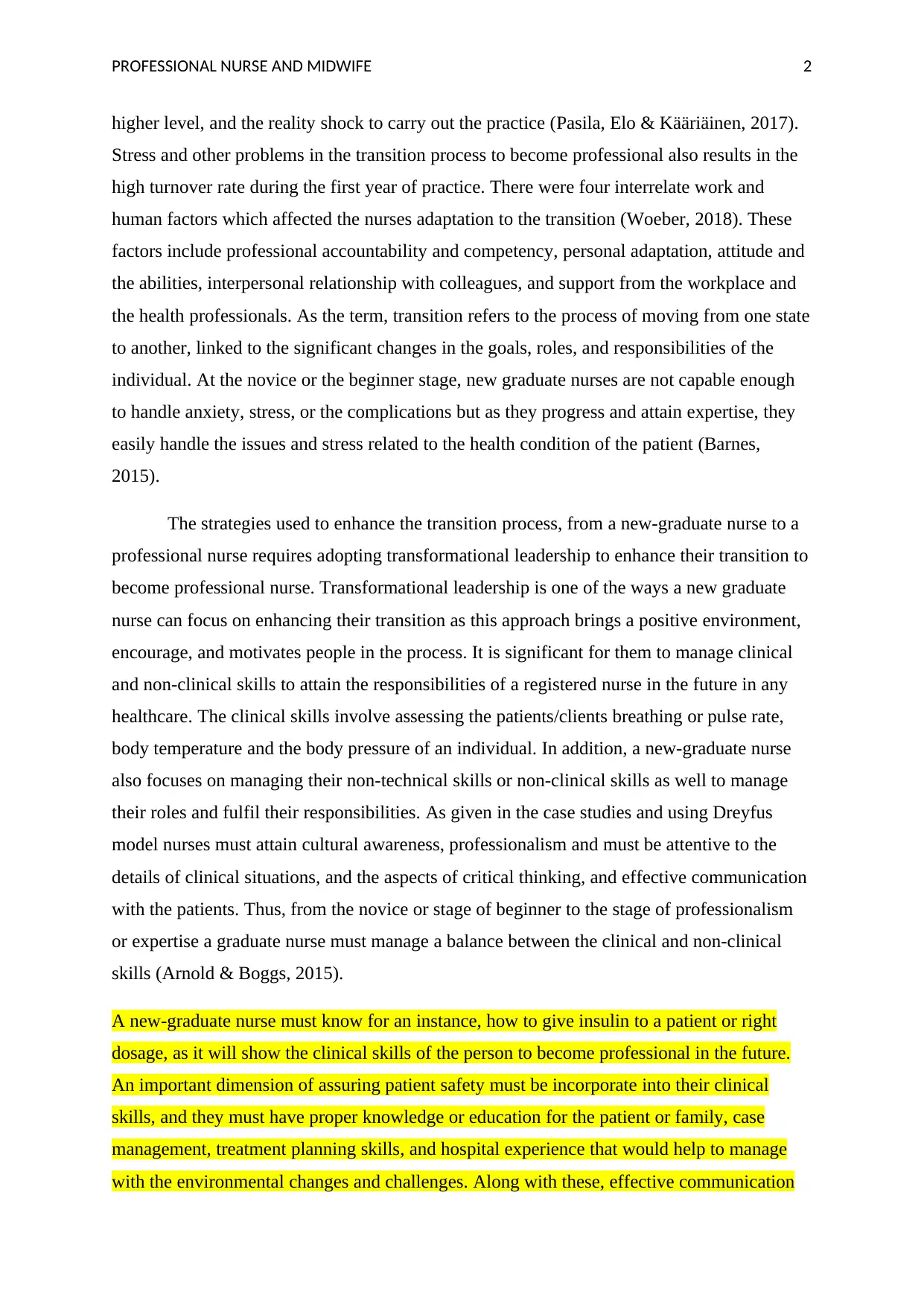
PROFESSIONAL NURSE AND MIDWIFE 2
higher level, and the reality shock to carry out the practice (Pasila, Elo & Kääriäinen, 2017).
Stress and other problems in the transition process to become professional also results in the
high turnover rate during the first year of practice. There were four interrelate work and
human factors which affected the nurses adaptation to the transition (Woeber, 2018). These
factors include professional accountability and competency, personal adaptation, attitude and
the abilities, interpersonal relationship with colleagues, and support from the workplace and
the health professionals. As the term, transition refers to the process of moving from one state
to another, linked to the significant changes in the goals, roles, and responsibilities of the
individual. At the novice or the beginner stage, new graduate nurses are not capable enough
to handle anxiety, stress, or the complications but as they progress and attain expertise, they
easily handle the issues and stress related to the health condition of the patient (Barnes,
2015).
The strategies used to enhance the transition process, from a new-graduate nurse to a
professional nurse requires adopting transformational leadership to enhance their transition to
become professional nurse. Transformational leadership is one of the ways a new graduate
nurse can focus on enhancing their transition as this approach brings a positive environment,
encourage, and motivates people in the process. It is significant for them to manage clinical
and non-clinical skills to attain the responsibilities of a registered nurse in the future in any
healthcare. The clinical skills involve assessing the patients/clients breathing or pulse rate,
body temperature and the body pressure of an individual. In addition, a new-graduate nurse
also focuses on managing their non-technical skills or non-clinical skills as well to manage
their roles and fulfil their responsibilities. As given in the case studies and using Dreyfus
model nurses must attain cultural awareness, professionalism and must be attentive to the
details of clinical situations, and the aspects of critical thinking, and effective communication
with the patients. Thus, from the novice or stage of beginner to the stage of professionalism
or expertise a graduate nurse must manage a balance between the clinical and non-clinical
skills (Arnold & Boggs, 2015).
A new-graduate nurse must know for an instance, how to give insulin to a patient or right
dosage, as it will show the clinical skills of the person to become professional in the future.
An important dimension of assuring patient safety must be incorporate into their clinical
skills, and they must have proper knowledge or education for the patient or family, case
management, treatment planning skills, and hospital experience that would help to manage
with the environmental changes and challenges. Along with these, effective communication
higher level, and the reality shock to carry out the practice (Pasila, Elo & Kääriäinen, 2017).
Stress and other problems in the transition process to become professional also results in the
high turnover rate during the first year of practice. There were four interrelate work and
human factors which affected the nurses adaptation to the transition (Woeber, 2018). These
factors include professional accountability and competency, personal adaptation, attitude and
the abilities, interpersonal relationship with colleagues, and support from the workplace and
the health professionals. As the term, transition refers to the process of moving from one state
to another, linked to the significant changes in the goals, roles, and responsibilities of the
individual. At the novice or the beginner stage, new graduate nurses are not capable enough
to handle anxiety, stress, or the complications but as they progress and attain expertise, they
easily handle the issues and stress related to the health condition of the patient (Barnes,
2015).
The strategies used to enhance the transition process, from a new-graduate nurse to a
professional nurse requires adopting transformational leadership to enhance their transition to
become professional nurse. Transformational leadership is one of the ways a new graduate
nurse can focus on enhancing their transition as this approach brings a positive environment,
encourage, and motivates people in the process. It is significant for them to manage clinical
and non-clinical skills to attain the responsibilities of a registered nurse in the future in any
healthcare. The clinical skills involve assessing the patients/clients breathing or pulse rate,
body temperature and the body pressure of an individual. In addition, a new-graduate nurse
also focuses on managing their non-technical skills or non-clinical skills as well to manage
their roles and fulfil their responsibilities. As given in the case studies and using Dreyfus
model nurses must attain cultural awareness, professionalism and must be attentive to the
details of clinical situations, and the aspects of critical thinking, and effective communication
with the patients. Thus, from the novice or stage of beginner to the stage of professionalism
or expertise a graduate nurse must manage a balance between the clinical and non-clinical
skills (Arnold & Boggs, 2015).
A new-graduate nurse must know for an instance, how to give insulin to a patient or right
dosage, as it will show the clinical skills of the person to become professional in the future.
An important dimension of assuring patient safety must be incorporate into their clinical
skills, and they must have proper knowledge or education for the patient or family, case
management, treatment planning skills, and hospital experience that would help to manage
with the environmental changes and challenges. Along with these, effective communication
⊘ This is a preview!⊘
Do you want full access?
Subscribe today to unlock all pages.

Trusted by 1+ million students worldwide
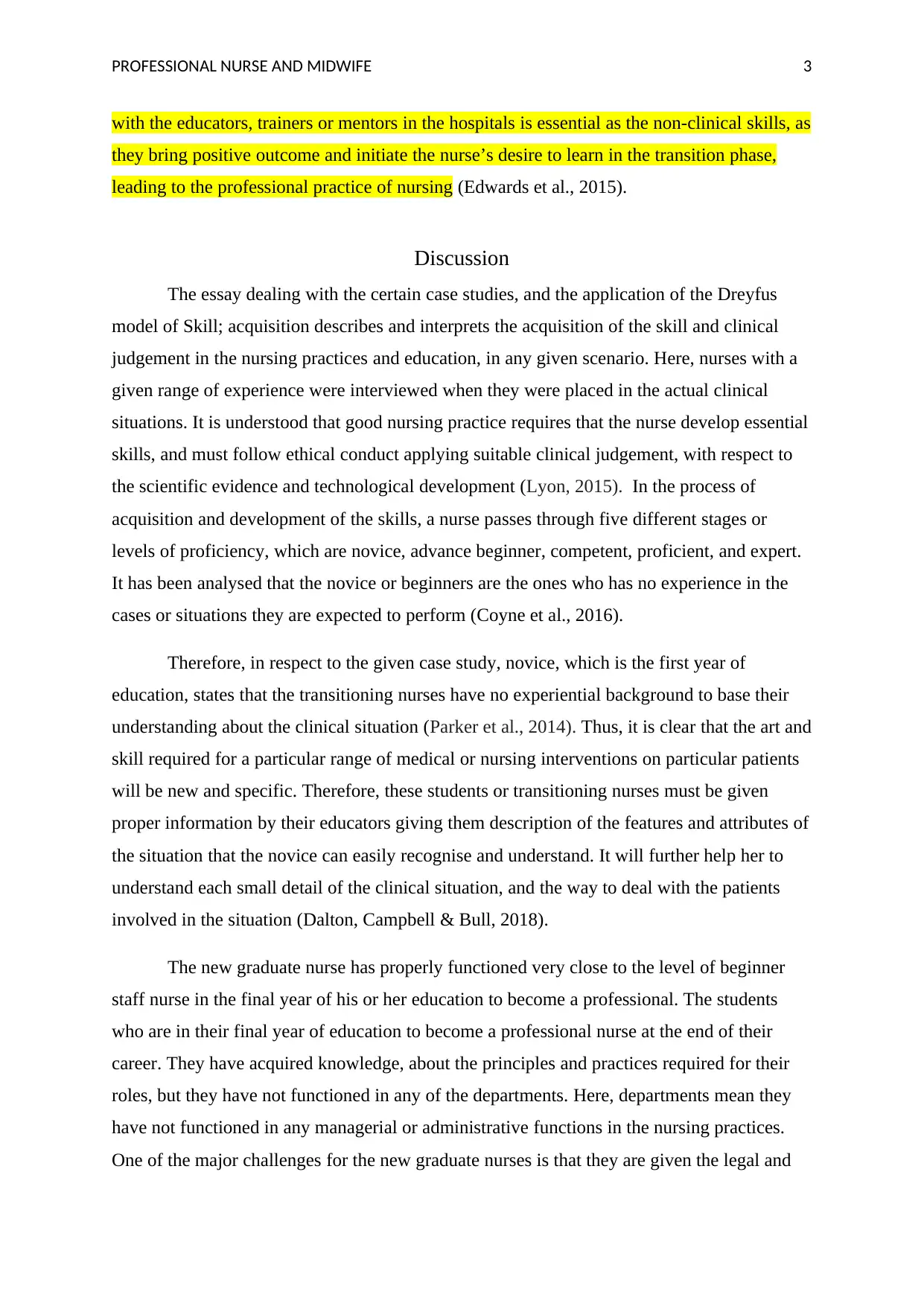
PROFESSIONAL NURSE AND MIDWIFE 3
with the educators, trainers or mentors in the hospitals is essential as the non-clinical skills, as
they bring positive outcome and initiate the nurse’s desire to learn in the transition phase,
leading to the professional practice of nursing (Edwards et al., 2015).
Discussion
The essay dealing with the certain case studies, and the application of the Dreyfus
model of Skill; acquisition describes and interprets the acquisition of the skill and clinical
judgement in the nursing practices and education, in any given scenario. Here, nurses with a
given range of experience were interviewed when they were placed in the actual clinical
situations. It is understood that good nursing practice requires that the nurse develop essential
skills, and must follow ethical conduct applying suitable clinical judgement, with respect to
the scientific evidence and technological development (Lyon, 2015). In the process of
acquisition and development of the skills, a nurse passes through five different stages or
levels of proficiency, which are novice, advance beginner, competent, proficient, and expert.
It has been analysed that the novice or beginners are the ones who has no experience in the
cases or situations they are expected to perform (Coyne et al., 2016).
Therefore, in respect to the given case study, novice, which is the first year of
education, states that the transitioning nurses have no experiential background to base their
understanding about the clinical situation (Parker et al., 2014). Thus, it is clear that the art and
skill required for a particular range of medical or nursing interventions on particular patients
will be new and specific. Therefore, these students or transitioning nurses must be given
proper information by their educators giving them description of the features and attributes of
the situation that the novice can easily recognise and understand. It will further help her to
understand each small detail of the clinical situation, and the way to deal with the patients
involved in the situation (Dalton, Campbell & Bull, 2018).
The new graduate nurse has properly functioned very close to the level of beginner
staff nurse in the final year of his or her education to become a professional. The students
who are in their final year of education to become a professional nurse at the end of their
career. They have acquired knowledge, about the principles and practices required for their
roles, but they have not functioned in any of the departments. Here, departments mean they
have not functioned in any managerial or administrative functions in the nursing practices.
One of the major challenges for the new graduate nurses is that they are given the legal and
with the educators, trainers or mentors in the hospitals is essential as the non-clinical skills, as
they bring positive outcome and initiate the nurse’s desire to learn in the transition phase,
leading to the professional practice of nursing (Edwards et al., 2015).
Discussion
The essay dealing with the certain case studies, and the application of the Dreyfus
model of Skill; acquisition describes and interprets the acquisition of the skill and clinical
judgement in the nursing practices and education, in any given scenario. Here, nurses with a
given range of experience were interviewed when they were placed in the actual clinical
situations. It is understood that good nursing practice requires that the nurse develop essential
skills, and must follow ethical conduct applying suitable clinical judgement, with respect to
the scientific evidence and technological development (Lyon, 2015). In the process of
acquisition and development of the skills, a nurse passes through five different stages or
levels of proficiency, which are novice, advance beginner, competent, proficient, and expert.
It has been analysed that the novice or beginners are the ones who has no experience in the
cases or situations they are expected to perform (Coyne et al., 2016).
Therefore, in respect to the given case study, novice, which is the first year of
education, states that the transitioning nurses have no experiential background to base their
understanding about the clinical situation (Parker et al., 2014). Thus, it is clear that the art and
skill required for a particular range of medical or nursing interventions on particular patients
will be new and specific. Therefore, these students or transitioning nurses must be given
proper information by their educators giving them description of the features and attributes of
the situation that the novice can easily recognise and understand. It will further help her to
understand each small detail of the clinical situation, and the way to deal with the patients
involved in the situation (Dalton, Campbell & Bull, 2018).
The new graduate nurse has properly functioned very close to the level of beginner
staff nurse in the final year of his or her education to become a professional. The students
who are in their final year of education to become a professional nurse at the end of their
career. They have acquired knowledge, about the principles and practices required for their
roles, but they have not functioned in any of the departments. Here, departments mean they
have not functioned in any managerial or administrative functions in the nursing practices.
One of the major challenges for the new graduate nurses is that they are given the legal and
Paraphrase This Document
Need a fresh take? Get an instant paraphrase of this document with our AI Paraphraser
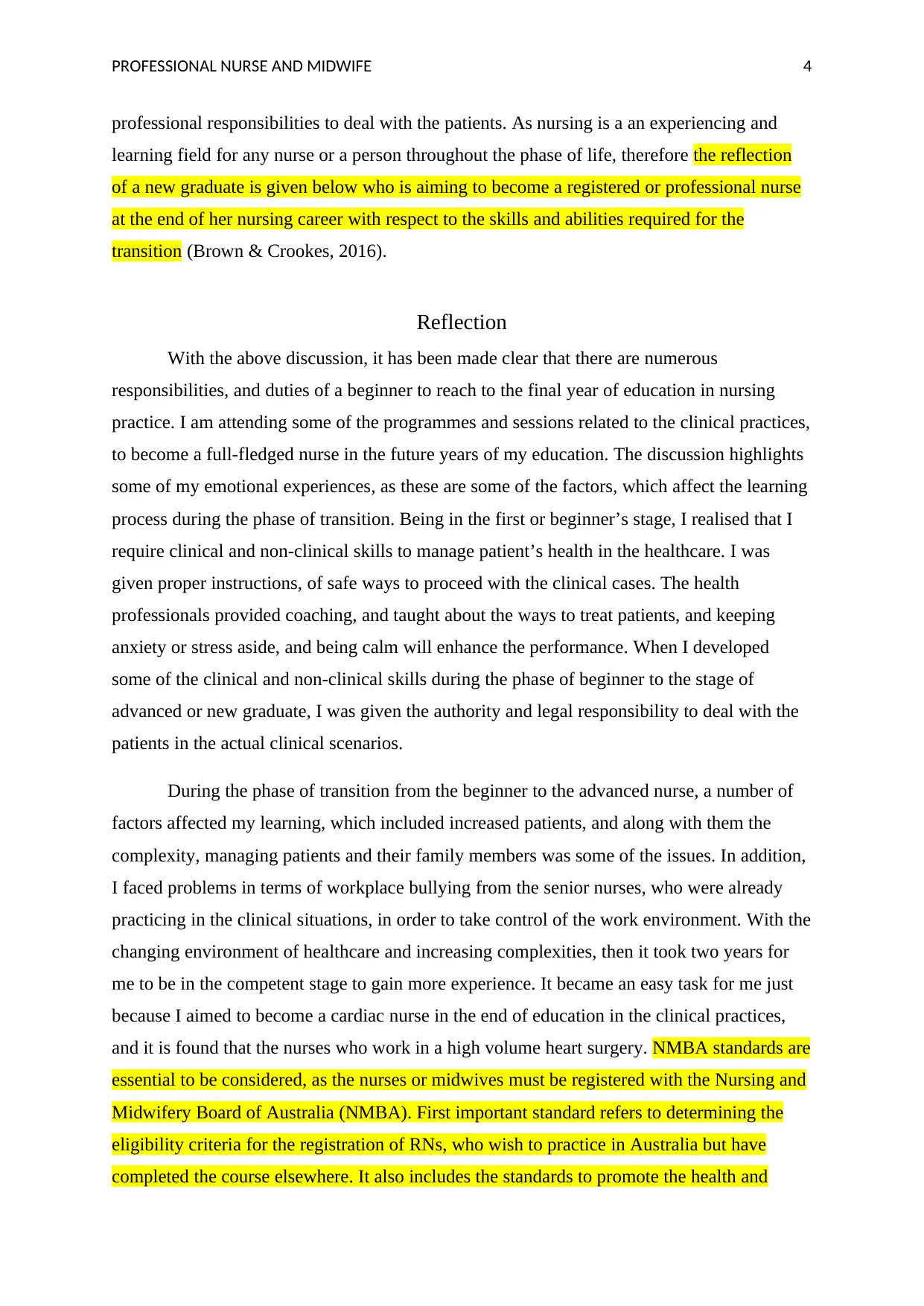
PROFESSIONAL NURSE AND MIDWIFE 4
professional responsibilities to deal with the patients. As nursing is a an experiencing and
learning field for any nurse or a person throughout the phase of life, therefore the reflection
of a new graduate is given below who is aiming to become a registered or professional nurse
at the end of her nursing career with respect to the skills and abilities required for the
transition (Brown & Crookes, 2016).
Reflection
With the above discussion, it has been made clear that there are numerous
responsibilities, and duties of a beginner to reach to the final year of education in nursing
practice. I am attending some of the programmes and sessions related to the clinical practices,
to become a full-fledged nurse in the future years of my education. The discussion highlights
some of my emotional experiences, as these are some of the factors, which affect the learning
process during the phase of transition. Being in the first or beginner’s stage, I realised that I
require clinical and non-clinical skills to manage patient’s health in the healthcare. I was
given proper instructions, of safe ways to proceed with the clinical cases. The health
professionals provided coaching, and taught about the ways to treat patients, and keeping
anxiety or stress aside, and being calm will enhance the performance. When I developed
some of the clinical and non-clinical skills during the phase of beginner to the stage of
advanced or new graduate, I was given the authority and legal responsibility to deal with the
patients in the actual clinical scenarios.
During the phase of transition from the beginner to the advanced nurse, a number of
factors affected my learning, which included increased patients, and along with them the
complexity, managing patients and their family members was some of the issues. In addition,
I faced problems in terms of workplace bullying from the senior nurses, who were already
practicing in the clinical situations, in order to take control of the work environment. With the
changing environment of healthcare and increasing complexities, then it took two years for
me to be in the competent stage to gain more experience. It became an easy task for me just
because I aimed to become a cardiac nurse in the end of education in the clinical practices,
and it is found that the nurses who work in a high volume heart surgery. NMBA standards are
essential to be considered, as the nurses or midwives must be registered with the Nursing and
Midwifery Board of Australia (NMBA). First important standard refers to determining the
eligibility criteria for the registration of RNs, who wish to practice in Australia but have
completed the course elsewhere. It also includes the standards to promote the health and
professional responsibilities to deal with the patients. As nursing is a an experiencing and
learning field for any nurse or a person throughout the phase of life, therefore the reflection
of a new graduate is given below who is aiming to become a registered or professional nurse
at the end of her nursing career with respect to the skills and abilities required for the
transition (Brown & Crookes, 2016).
Reflection
With the above discussion, it has been made clear that there are numerous
responsibilities, and duties of a beginner to reach to the final year of education in nursing
practice. I am attending some of the programmes and sessions related to the clinical practices,
to become a full-fledged nurse in the future years of my education. The discussion highlights
some of my emotional experiences, as these are some of the factors, which affect the learning
process during the phase of transition. Being in the first or beginner’s stage, I realised that I
require clinical and non-clinical skills to manage patient’s health in the healthcare. I was
given proper instructions, of safe ways to proceed with the clinical cases. The health
professionals provided coaching, and taught about the ways to treat patients, and keeping
anxiety or stress aside, and being calm will enhance the performance. When I developed
some of the clinical and non-clinical skills during the phase of beginner to the stage of
advanced or new graduate, I was given the authority and legal responsibility to deal with the
patients in the actual clinical scenarios.
During the phase of transition from the beginner to the advanced nurse, a number of
factors affected my learning, which included increased patients, and along with them the
complexity, managing patients and their family members was some of the issues. In addition,
I faced problems in terms of workplace bullying from the senior nurses, who were already
practicing in the clinical situations, in order to take control of the work environment. With the
changing environment of healthcare and increasing complexities, then it took two years for
me to be in the competent stage to gain more experience. It became an easy task for me just
because I aimed to become a cardiac nurse in the end of education in the clinical practices,
and it is found that the nurses who work in a high volume heart surgery. NMBA standards are
essential to be considered, as the nurses or midwives must be registered with the Nursing and
Midwifery Board of Australia (NMBA). First important standard refers to determining the
eligibility criteria for the registration of RNs, who wish to practice in Australia but have
completed the course elsewhere. It also includes the standards to promote the health and
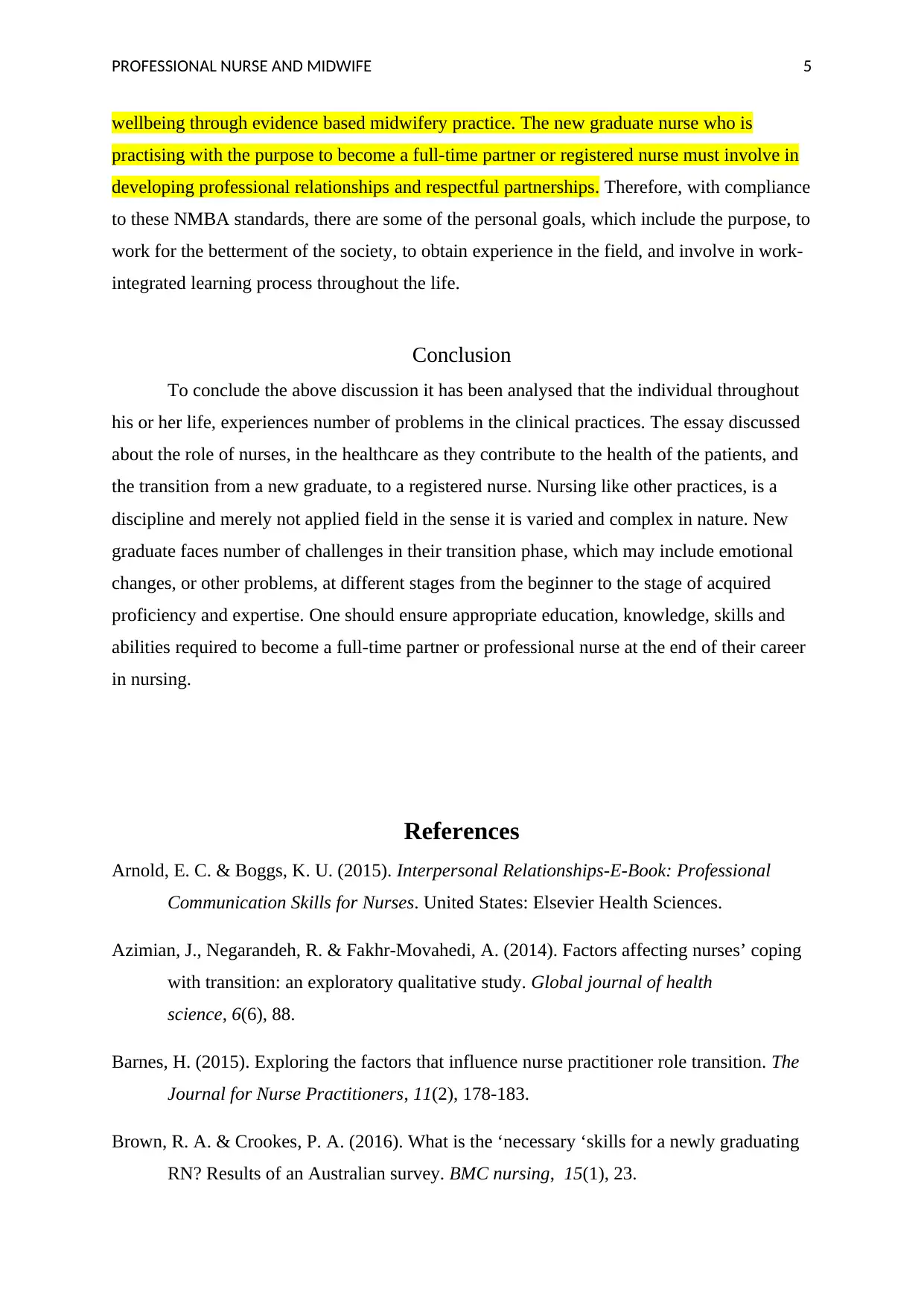
PROFESSIONAL NURSE AND MIDWIFE 5
wellbeing through evidence based midwifery practice. The new graduate nurse who is
practising with the purpose to become a full-time partner or registered nurse must involve in
developing professional relationships and respectful partnerships. Therefore, with compliance
to these NMBA standards, there are some of the personal goals, which include the purpose, to
work for the betterment of the society, to obtain experience in the field, and involve in work-
integrated learning process throughout the life.
Conclusion
To conclude the above discussion it has been analysed that the individual throughout
his or her life, experiences number of problems in the clinical practices. The essay discussed
about the role of nurses, in the healthcare as they contribute to the health of the patients, and
the transition from a new graduate, to a registered nurse. Nursing like other practices, is a
discipline and merely not applied field in the sense it is varied and complex in nature. New
graduate faces number of challenges in their transition phase, which may include emotional
changes, or other problems, at different stages from the beginner to the stage of acquired
proficiency and expertise. One should ensure appropriate education, knowledge, skills and
abilities required to become a full-time partner or professional nurse at the end of their career
in nursing.
References
Arnold, E. C. & Boggs, K. U. (2015). Interpersonal Relationships-E-Book: Professional
Communication Skills for Nurses. United States: Elsevier Health Sciences.
Azimian, J., Negarandeh, R. & Fakhr-Movahedi, A. (2014). Factors affecting nurses’ coping
with transition: an exploratory qualitative study. Global journal of health
science, 6(6), 88.
Barnes, H. (2015). Exploring the factors that influence nurse practitioner role transition. The
Journal for Nurse Practitioners, 11(2), 178-183.
Brown, R. A. & Crookes, P. A. (2016). What is the ‘necessary ‘skills for a newly graduating
RN? Results of an Australian survey. BMC nursing, 15(1), 23.
wellbeing through evidence based midwifery practice. The new graduate nurse who is
practising with the purpose to become a full-time partner or registered nurse must involve in
developing professional relationships and respectful partnerships. Therefore, with compliance
to these NMBA standards, there are some of the personal goals, which include the purpose, to
work for the betterment of the society, to obtain experience in the field, and involve in work-
integrated learning process throughout the life.
Conclusion
To conclude the above discussion it has been analysed that the individual throughout
his or her life, experiences number of problems in the clinical practices. The essay discussed
about the role of nurses, in the healthcare as they contribute to the health of the patients, and
the transition from a new graduate, to a registered nurse. Nursing like other practices, is a
discipline and merely not applied field in the sense it is varied and complex in nature. New
graduate faces number of challenges in their transition phase, which may include emotional
changes, or other problems, at different stages from the beginner to the stage of acquired
proficiency and expertise. One should ensure appropriate education, knowledge, skills and
abilities required to become a full-time partner or professional nurse at the end of their career
in nursing.
References
Arnold, E. C. & Boggs, K. U. (2015). Interpersonal Relationships-E-Book: Professional
Communication Skills for Nurses. United States: Elsevier Health Sciences.
Azimian, J., Negarandeh, R. & Fakhr-Movahedi, A. (2014). Factors affecting nurses’ coping
with transition: an exploratory qualitative study. Global journal of health
science, 6(6), 88.
Barnes, H. (2015). Exploring the factors that influence nurse practitioner role transition. The
Journal for Nurse Practitioners, 11(2), 178-183.
Brown, R. A. & Crookes, P. A. (2016). What is the ‘necessary ‘skills for a newly graduating
RN? Results of an Australian survey. BMC nursing, 15(1), 23.
⊘ This is a preview!⊘
Do you want full access?
Subscribe today to unlock all pages.

Trusted by 1+ million students worldwide
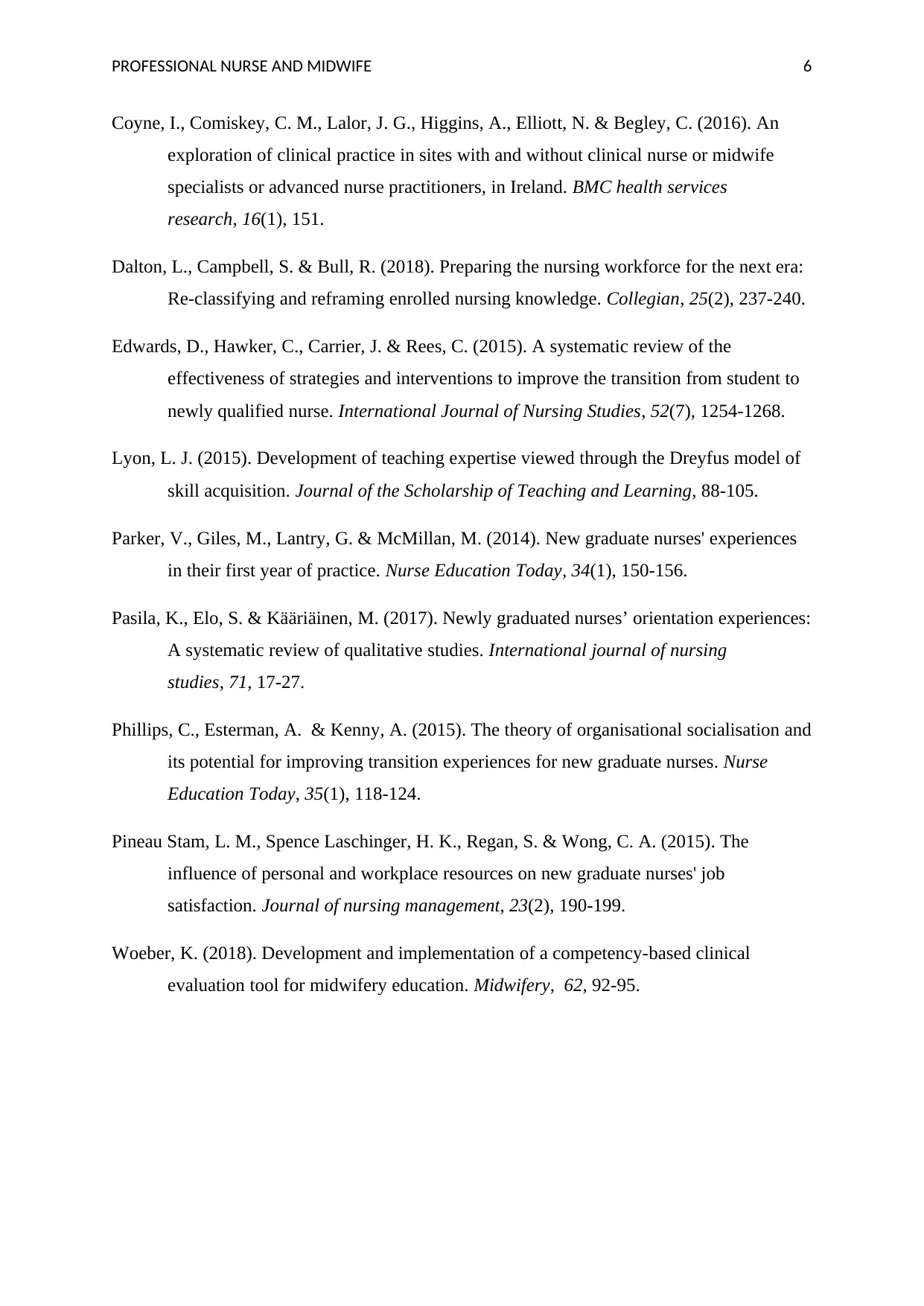
PROFESSIONAL NURSE AND MIDWIFE 6
Coyne, I., Comiskey, C. M., Lalor, J. G., Higgins, A., Elliott, N. & Begley, C. (2016). An
exploration of clinical practice in sites with and without clinical nurse or midwife
specialists or advanced nurse practitioners, in Ireland. BMC health services
research, 16(1), 151.
Dalton, L., Campbell, S. & Bull, R. (2018). Preparing the nursing workforce for the next era:
Re-classifying and reframing enrolled nursing knowledge. Collegian, 25(2), 237-240.
Edwards, D., Hawker, C., Carrier, J. & Rees, C. (2015). A systematic review of the
effectiveness of strategies and interventions to improve the transition from student to
newly qualified nurse. International Journal of Nursing Studies, 52(7), 1254-1268.
Lyon, L. J. (2015). Development of teaching expertise viewed through the Dreyfus model of
skill acquisition. Journal of the Scholarship of Teaching and Learning, 88-105.
Parker, V., Giles, M., Lantry, G. & McMillan, M. (2014). New graduate nurses' experiences
in their first year of practice. Nurse Education Today, 34(1), 150-156.
Pasila, K., Elo, S. & Kääriäinen, M. (2017). Newly graduated nurses’ orientation experiences:
A systematic review of qualitative studies. International journal of nursing
studies, 71, 17-27.
Phillips, C., Esterman, A. & Kenny, A. (2015). The theory of organisational socialisation and
its potential for improving transition experiences for new graduate nurses. Nurse
Education Today, 35(1), 118-124.
Pineau Stam, L. M., Spence Laschinger, H. K., Regan, S. & Wong, C. A. (2015). The
influence of personal and workplace resources on new graduate nurses' job
satisfaction. Journal of nursing management, 23(2), 190-199.
Woeber, K. (2018). Development and implementation of a competency-based clinical
evaluation tool for midwifery education. Midwifery, 62, 92-95.
Coyne, I., Comiskey, C. M., Lalor, J. G., Higgins, A., Elliott, N. & Begley, C. (2016). An
exploration of clinical practice in sites with and without clinical nurse or midwife
specialists or advanced nurse practitioners, in Ireland. BMC health services
research, 16(1), 151.
Dalton, L., Campbell, S. & Bull, R. (2018). Preparing the nursing workforce for the next era:
Re-classifying and reframing enrolled nursing knowledge. Collegian, 25(2), 237-240.
Edwards, D., Hawker, C., Carrier, J. & Rees, C. (2015). A systematic review of the
effectiveness of strategies and interventions to improve the transition from student to
newly qualified nurse. International Journal of Nursing Studies, 52(7), 1254-1268.
Lyon, L. J. (2015). Development of teaching expertise viewed through the Dreyfus model of
skill acquisition. Journal of the Scholarship of Teaching and Learning, 88-105.
Parker, V., Giles, M., Lantry, G. & McMillan, M. (2014). New graduate nurses' experiences
in their first year of practice. Nurse Education Today, 34(1), 150-156.
Pasila, K., Elo, S. & Kääriäinen, M. (2017). Newly graduated nurses’ orientation experiences:
A systematic review of qualitative studies. International journal of nursing
studies, 71, 17-27.
Phillips, C., Esterman, A. & Kenny, A. (2015). The theory of organisational socialisation and
its potential for improving transition experiences for new graduate nurses. Nurse
Education Today, 35(1), 118-124.
Pineau Stam, L. M., Spence Laschinger, H. K., Regan, S. & Wong, C. A. (2015). The
influence of personal and workplace resources on new graduate nurses' job
satisfaction. Journal of nursing management, 23(2), 190-199.
Woeber, K. (2018). Development and implementation of a competency-based clinical
evaluation tool for midwifery education. Midwifery, 62, 92-95.
Paraphrase This Document
Need a fresh take? Get an instant paraphrase of this document with our AI Paraphraser
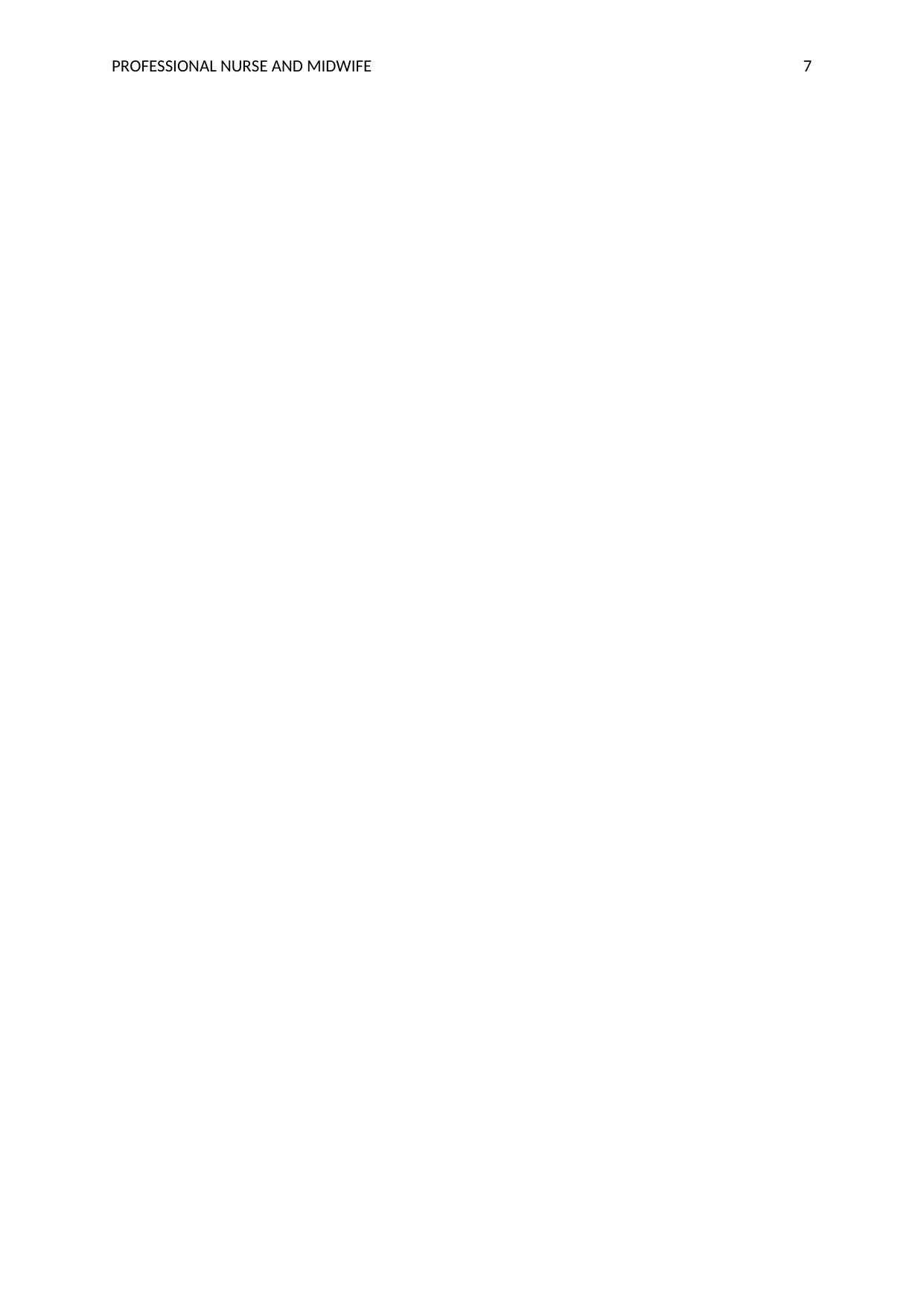
PROFESSIONAL NURSE AND MIDWIFE 7
1 out of 8
Related Documents
Your All-in-One AI-Powered Toolkit for Academic Success.
+13062052269
info@desklib.com
Available 24*7 on WhatsApp / Email
![[object Object]](/_next/static/media/star-bottom.7253800d.svg)
Unlock your academic potential
Copyright © 2020–2025 A2Z Services. All Rights Reserved. Developed and managed by ZUCOL.




